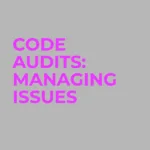Introduction:
Code audits play an indispensable role in the dynamic landscape of tech investments. As an investor, you often face critical decisions that depend on the quality and viability of software assets. Here lies the fundamental question: “How long does a code audit typically take?” This guide aims to unravel the complexities of code audit timelines, equipping you with essential knowledge for your investment journey.
Decoding the Code Audit
At its core, a code audit is a meticulous examination of software’s source code. Its purpose is to unearth any errors, security vulnerabilities, and potential areas of improvement. This step is not just a technical formality; it’s a cornerstone in evaluating the worthiness of a software investment. A thorough code audit can illuminate the strengths and weaknesses of a codebase, offering a clear picture of its future potential and longevity.
Why Audit Timelines Vary
Why Audit Timelines Vary
Code audit timelines are dynamic and subject to change, influenced by various factors. Primarily, the size and complexity of the software under examination play a significant role in determining the duration of the audit. This variability is a critical aspect to consider for setting realistic expectations about the audit process.
- Size of the Software: The physical size of the software, measured in lines of code or the number of features, directly impacts the audit timeline. Larger software with more lines of code naturally takes longer to review comprehensively. It’s not just about the quantity of the code but also the interconnectedness of various components within the software.
- Complexity of the Codebase: Complexity goes beyond size. It includes the intricacy of the code structure, the use of advanced programming paradigms, and the incorporation of various technologies and frameworks. Complex codebases require more time for auditors to understand and analyze thoroughly. They often contain intricate algorithms or sophisticated architectures that demand careful examination to fully grasp their nuances.
- Nature of the Application: The type of application also influences the audit duration. For instance, a simple utility app with straightforward functionality can be audited more quickly than a full-fledged enterprise system with multiple integrations and functionalities. The latter requires a more detailed approach to ensure every aspect of the system is properly evaluated.
- Existing Documentation: The availability and quality of documentation can also impact the audit timeline. Well-documented codebases allow auditors to quickly understand the software’s architecture and logic, potentially speeding up the process. Conversely, poorly documented or undocumented code can significantly prolong the audit as the team may need to spend additional time deciphering the code’s purpose and functionality.
- Auditor Expertise and Tools: The experience level of the auditing team and the tools at their disposal are also crucial factors. Experienced auditors, equipped with advanced analytical tools, can navigate and evaluate a codebase more efficiently, reducing the time required for a thorough audit.

Factors That Influence Audit Duration
Several key factors dictate the length of a code audit:
- Complexity of the Codebase: More intricate code structures require deeper analysis.
- Specific Objectives of the Audit: Whether the focus is on security, performance, or overall code health can alter the timeline.
- Resources and Expertise of the Auditing Team: Experienced auditors with advanced tools can navigate the codebase more efficiently, affecting the audit duration.
The Balancing Act: Speed vs. Thoroughness
There’s an inherent balancing act in code auditing – speed versus thoroughness. A rapid audit might need to include critical nuances, while an overly detailed audit could delay investment decisions. The key is to strike a balance, ensuring the audit is comprehensive enough to uncover crucial insights yet swift enough to keep pace with the investment timelines.
Tailoring Audits to Investor Needs
Each investment scenario is unique, and so should the approach to code auditing. Tailoring the audit to address specific investor concerns – scalability, security, or code quality – is vital. Customized audits resonate more with your particular investment criteria and provide more relevant, actionable insights.
Making Informed Investment Decisions
Code audits are instrumental in mitigating investment risks. They offer a window into the software’s future performance and maintenance needs, informing your decision-making process. Incorporating these audits into your due diligence routine is a step towards more informed, confident investment choices.
Conclusion
In conclusion, understanding the timeline of a code audit is a critical aspect of tech investment. The duration of a code audit can significantly vary, influenced by factors like code complexity, audit objectives, and the expertise of the auditing team. As an investor, appreciating this variability and seeking tailored audits can profoundly impact your decision-making process.
Are you poised to invest in tech and need a comprehensive code audit aligning with your needs? Reach out for a professional code audit that offers the depth, efficiency, and customization required to make informed investment decisions.



